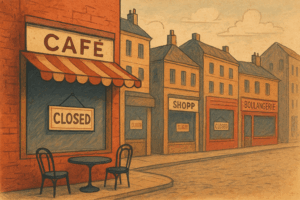Since digital and teleworking are sweeping everything away in their path and it is now possible to work completely remotely, the question of the relevance of local businesses (restaurants, cafes, services, etc.) located in former office districts arises.
A time of choppy work
In fact, teleworking is pushing employees to a four-day week, even if it hasn't been legally formalized yet. In practice, the number of people visiting local shops on Fridays has dropped by more than 50%. However, Friday should (logically) be the busiest day at work, and therefore at the lunch restaurant, since it's the last day of work, the opportunity to toast with colleagues, network, and go out in the evening.
But instead, city dwellers' schedules are fragmented, leading to a redistribution of shop-going through a sprawl phenomenon. Going to work is no longer a requirement for service sector jobs, which also poses a real issue of hardship for those who work in a profession that, by its very nature, cannot be done from home, but let's move on from that point.
The fact is that going to the office is done at the employee's discretion, which seemed unimaginable before 2020. A rainy day, a drop in motivation, a flat tire, a child to look after... so many legitimate excuses to stay at home... are so many days unemployed worked from home.
Not to mention the often faulty public transport, the unbearable insecurity, or the deliberate strategy of "depopulation" of city centers, carried out by the public authorities with paid parking for two-wheelers, restricted areas and increasingly complicated access. Result: Paris - and other major Western metropolises - are gradually transforming into museum cities, frozen in their past, and almost incapable of writing their futures, since deserted by daily life, as if emptied of their substance.
In short, all of this put together has literally changed the lives of employees, and the widespread adoption of teleworking will surely disrupt urban planning by diluting the density of travel and housing.

But not everything about this new work organization is bad—far from it. On the positive side, employees are less stressed, more satisfied, and report being more engaged in their work. They spend less time commuting, and they have more time for their personal lives and families, which is indeed a very good thing.
On the other hand, there are some big drawbacks to all this, and that's what we're going to see right away...
Teleworking: the other side of the coin
A loss of efficiency
Among the disadvantages induced by teleworking, we could mention the decrease in productivity of certain employees, a decrease in responsiveness of technical support from companies (suffered by the customers of these companies), a decrease in communication between employees and therefore a decrease in the efficiency of these companies.
A lack of cohesion between employees
Still on the downside, we could mention the human connection between employees which is reduced to next to nothing, whether for the efficiency of the company or even from a purely personal point of view, for friendly or romantic encounters, not to mention the increase in sedentary lifestyles, loneliness as well as the reduction in exposure to light, which brings us to the next point.
Problems with loneliness and a sedentary lifestyle
The digitalization of everything (movies, work, online dating, etc.) is creating a generation of employees and human beings who very rarely move, and very rarely connect in real life with other people.
The result is a kind of habituation to solitude, and a reduction in interpersonal emotions, with all the physical and mental health problems that this can cause in terms of longevity and happiness.
A societal destiny in danger
Finally, if we wanted to be complete, we could even mention the civilizational consequences of this organized lethargy: the atomization of individuals and the isolation of feelings have never allowed any community to emerge, flourish or prosper, and this is all the more true in a world where competition is increasingly fierce. Cloistering individuals, dislocating exchanges and preventing minds from meeting also means deactivating any collective consciousness - and therefore any project for society.
From a philosophical perspective, in a world subject to technological injunctions and the war of artificial intelligence, it would be interesting to formulate a civilizational counter-proposal. A proposal that places connection, place, and humanity back at the heart of the collective project.
Local trade, the lifeblood of society, is in danger
To return to our problem, the latest blow concerns local businesses, whose footfall has plummeted, causing a cascade of bankruptcies in large city centers, and rental values which are likely to fall within a few years.
Yet local businesses form the true economic and social fabric of a city. In the digital age, they are the last bulwark against the "world after," and even embody the hope of a social, vibrant, and imperfect "post-world after"—one whose driving force would be Cafés de Flore 2.0, rather than the standardized and sanitized American-Asian coffee shops.
So while we wait for the creation of modern work centers or decentralized eco-villages, including swimming pools, gyms, restaurants, bridge clubs, nurseries and why not a bit of tree climbing, what is the future in city centers for restaurants, cafes and shops in general that are not located in a tourist area but are located in the old work and meeting centers?
No one knows, but in the meantime, here are some ideas for surviving as long as it takes...
Solutions for businesses facing teleworking
1/ Adjustment of workforce and opening days.
Produce statistics on days of reduced attendance and adjust the workforce accordingly, or even calculate the benefit/cost of closing certain days;
2/ The call for technology to reduce costs
Improve processes and productivity by simplifying the menu and using machines (kitchen, ordering terminals, robots, innovations, etc.) not to replace humans but to relieve them on days when everyone comes at the same time.
3/ Diversification
Offer differentiating offers on off days, in order to start recruiting a different clientele (locals, tourists, etc.).
4/ Conversely, refocus your offer
Another option, while in times of crisis we tend to try everything, diversify our offer too much and confuse the message to the consumer, while it is possible as a strategy to take the opposite approach and improve the experience and the perceived value in your area of expertise, in order to convince the customer to come and consume at your place (typical example with the coffee shop), even if this advice goes against the previous advice which recommended differentiating your offer, but it is up to everyone to find their own formula.
5/ “Cost cutting”
Reduce all incidental costs and hidden costs, while waiting to regain some colour, while waiting to regain economic balance, if the current urban model can still offer one.
6/ Decentralization
Start looking into facilities in decentralized locations whose dynamism is maintained by rejecting city centers like Paris (suburbs, shopping centers, business centers on the outskirts, small provincial towns, etc.).
7/ Communicate
Communicate, communicate, communicate, since today, everything is (unfortunately) more than social networks and self-promotion...
If you have other ideas or would like to bounce back, don’t hesitate to leave a comment 😉





